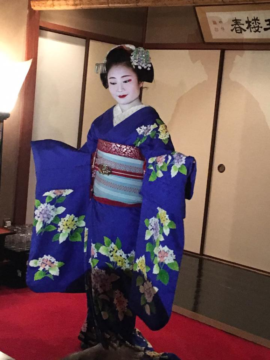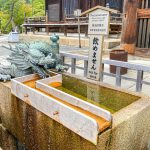 Geiko (modern day Geishas) are arguably the most iconic symbol of Japan. Their kimonos and white makeup distinguish them as an almost Japanese celebrity. The name Geiko translated literally means “person of the arts” as they are highly trained in various performing arts, including traditional Japanese dance and classical music. Some of their other training includes learning how to be great conversationalists and leading tea ceremonies to entertain their clientele. These young women start their journey as Maiko, meaning a Geiko in training, spending years practicing different skill sets before graduating to Geiko status. It may surprise some to learnthat the very first geishas were actually men. It was almost two decades later when women would take over the Geisha role.
Geiko (modern day Geishas) are arguably the most iconic symbol of Japan. Their kimonos and white makeup distinguish them as an almost Japanese celebrity. The name Geiko translated literally means “person of the arts” as they are highly trained in various performing arts, including traditional Japanese dance and classical music. Some of their other training includes learning how to be great conversationalists and leading tea ceremonies to entertain their clientele. These young women start their journey as Maiko, meaning a Geiko in training, spending years practicing different skill sets before graduating to Geiko status. It may surprise some to learnthat the very first geishas were actually men. It was almost two decades later when women would take over the Geisha role.
Traditionally, Geishas started painting their faces white so they could be better seen in candlelight. They continue the tradition today in honor of their history. The makeup a Maiko is wearing can also be indicative of where theyare in their training. If you see a Maiko with only their lower lip painted, this means that they are new to the training and have not earned the top lip being painted. Girls as young as 14 can decide to join the house and start their training. Their training typically takes about 5 years to complete. Once the Maiko graduate to Geiko status, they are free to live and work on their own, although, they are not permitted to get married. If the Gaiko decided to get married, they have to forfeit their Gaiko status.
Today, you will find the Geikos and Maikos in the Gion District of Kyoto. If you are in the area and very lucky, you may spot one walking to their evening appointment. You can tell the difference between the two in very subtle ways. The Maiko will have more ornaments in their hair and a more brightly colored Kimono, while the Gaikos wear a more simple, sophisticated Kimono and hairstyle.
Many of our tours offer a Tea Ceremony and other cultural activities that feature a Maiko performance. Clients have the opportunity to learn matcha making and drinking skills, ask the Maiko questions, and take some pictures with her. The cultural experience gives clients a great sense of how Japan is bringing its past into the future.





